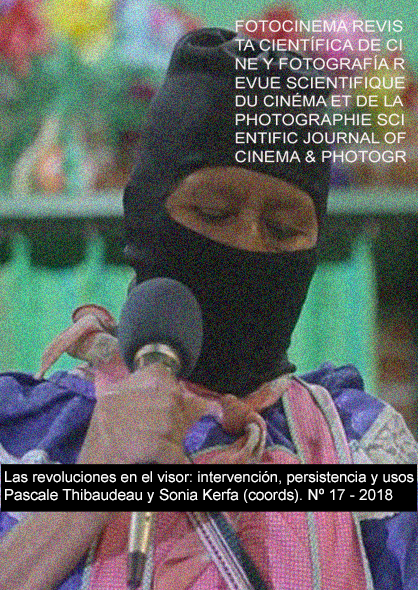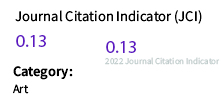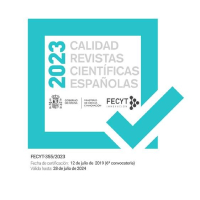No podemos hablar ya sino a través de los restos: fragment and phantasm of the mexican 68 in contemporary experimental cinema
DOI:
https://doi.org/10.24310/Fotocinema.2018.v0i17.5132Keywords:
Militant Cinema, Experimental Cinema, Counter-archives, Recycling, Figuration, Mexico 1968Abstract
This paper explores a series of contemporary audiovisual practices that take up the task of revisiting a visual legacy of the Mexican 68, made public in a recent curatorial project of reappropiation of rare filmic footage of the epoch, Hacer memoria - Por ahí del 68… (Festival Ambulante 2018). This task is structured around the intersection of three different genealogies of film practices: first, the legacy of militant film collectives of the sixties and seventies, and the aim of making political interventions on the social sphere, as it is being revisited with a more or less self conscious affiliation; second, the experimental tradition, especially those practices making emphasis around the interplay of two axis: (re)appropriation and resignification of film footage, and the artisanal work with obsolescent film materials and formats, such as 8 mm, 16 mm or Super 8. Last, what has come to be known, at least for the last two decades, as “archive practices," that is, the task of rethinking historical narratives by way of “counter-archives” that help construct collective (post) memories seeking to undermine, and open up for a critical consideration, hegemonic narratives.Downloads
Metrics
References
Agamben, G. (2008). Difference and Repetition: On Guy Debord Films. En Tanya Leighton (ed.), Art and the Moving Image: A Critical Reader (pp. 328-333). Londres / Nueva York: Tate Publishing / Afterall.
Avilés, J. (2015). Símbolos para la memoria. El movimiento estudiantil mexicano de 1968 en su cine (1968-2013) [Tesis doctoral]. Ciudad de México: UNAM. http://132.248.9.195/ptd2015/febrero/401059003/Index.html
Amad, P. (2010). Counter-Archive. Film, the everyday, and Albert Kahn’s Archives de la Planète. Nueva York: Columbia University Press.
Balsom, E. (2017). The Reality- Based Community. e-Flux 83. https://www.e-flux.com/journal/83/142332/the-reality-based-community/
Bazin, A. (2001). Ontología de la imagen cinematográfica. En ¿Qué es el cine? (pp. 23-30). Madrid: Rialp.
Benjamin, W. (2007). El surrealismo [1929]. En Obras. Libro II. Vol. 1 (pp. 301-316). Madrid: Abada.
Bosteels, B. (2016). Marx y Freud en América Latina. Política, psicoanálisis y religión en tiempos de terror. Madrid: Akal.
Cangi, A. (2016). Meditaciones sobre el dolor. En Florencia Incarbone y Sebastián Wiedemann (eds.), La radicalidad de la imagen. Des-bordando latitudes latinoamericanas (pp. 85-104). Buenos Aires: Hambre.
Cuevas, A. (2016). La escena experimental del cine mexicano: el resurgimiento. En Florencia Incarbone y Sebastián Wiedemann (eds.), La radicalidad de la imagen. Des-bordando latitudes latinoamericanas (pp. 55-68). Buenos Aires: Hambre.
Daney, S. (1976). Le thérrorisé (pédagogie godardienne). Cahiers du cinéma núm. 262, 32-40.
De la Vega Alfaro, E. (1999). Notas sobre el movimiento estudiantil-popular de 1968 en el cine mexicano. Secuencias 10, 66-81.
Debuysere, S. (2016). Figures of Dissent. Cinema of Politics, Politics of Cinema. Gante: AraMER.
Didi-Huberman, G. (2008). La ressemblance par contact. Archéologie, anachronisme etmodernité de l’empreinte. París: Les éditions de minuit.
Didi-Huberman, G, (2014). Pueblos expuestos, pueblos figurantes. Buenos Aires: Manantial.
Diéguez, I. (2018). Imaginar la forma de la ausencia. En Ileana Diéguez (comp.), Cartografías críticas. Volumen I. Prácticas políticas y poéticas que piensan la pérdida y la desaparición forzada. Los Angeles: Ediciones KARPA.
Emmelhainz, I. (2016). Cine militante: del internacionalismo a la política sensible neoliberal. Secuencias 43-44, 95-111. DOI: http://dx.doi.org/10.15366/secuencias2016.43-44.006
Errazu, M. (2018). Barrar las imágenes, las palabras, los sonidos, las voces. Sobre 2 de octubre / Lejos de Tlatelolco, de Los ingrávidos. Toma Uno 6 (verano), 119-137.
Flaherty, G. F. (2016). Hotel Mexico. Dwelling on the ’68 Movement. Los Angeles: University Of California Press.
Foster, H. (2004). An Archival Impulse. October 110 (otoño), 3–22.
Foster, H. (2012). Post-critical. October 139 (invierno), 3–8.
García Espinosa, J. (1971). Por un cine imperfecto [1969]. Cine cubano 66/67, 46-53.
Incarbone, F. (2014). Por un nuevo Abecedario. En BIM. Bienal de la Imagen en Movimiento. Memoria 2014 (pp. 71-76). Buenos Aires, EDUNTREF.
Ingrávidos, Los (2016). El lenguaje de los huesos en la nueva Tenochtitlán. En Florencia Incarbone y Sebastián Wiedemann (eds.), La radicalidad de la imagen. Des-bordando latitudes latinoamericanas (pp. 147-155). Buenos Aires: Hambre.
Knowles, K. & Beugnet, M. (2013). The aesthetics and politics of obsolescence: Hand-made film in the era of the digital. Moving Image Review & Art Journal 2 (1), 55-65. DOI: 10.1386/miraj.2.1.54_1
Lerner, J. & González, R. (1998). Cine Mexperimental. 60 años de vanguardia en México. Santa Monica, CA: Smart Art Press.
Paz, O. (2008). Posdata [1970]. México: Siglo XXI.
Rancière, J. (1976). L’Image Fraternelle. Entretien avec Jacques Rancière. Cahiers du Cinéma 268-269, 7-20.
Rancière, J. (2010). El espectador emancipado. Buenos Aires: Bordes Manantial.
Revueltas, J. (2018). México 68. Juventud y Revolución. Ciudad de México: Era.
Rodowick, D. N. (2007). The Virtual Life of Film. Londres: Harvard University Press.
Rodowick, D. N. (1988). The Crisis of Political Modernism. Criticism and Ideology in Contemporary Film Theory. Berkeley: University of California Press.
Ross, K. (2008). Mayo de 68 y sus vidas posteriores. Ensayo contra la despolitización de la memoria. Madrid: Acuarela & Antonio Machado Libros.
Russell, C. (2018). Archiveology: Walter Benjamin and Archival Film Practices, Durham & Londres: Duke U. Press.
Soto, T. (2018). Por ahí del 68… https://www.ambulante.org/hacer-memoria-archivos-del-68/ (recuperada el 2 de junio de 2018)
Soto, T. (2017). O arquivo e a promessa da memória En Arquivo en Cartaz. Festival Internacional de Cinema de Arquivo (pp. 74-83). Rio de Janeiro: Arquivo Nacional.
Steinberg, S. (2016). Photopoetics at Tlatelolco. Afterimages of Mexico, 1968. Austin: University of Texas Press.
Taibo II, P. I. (2006). 68 [1991]. Madrid: Traficantes de sueños.
Turvey, M., Jacobs, K., Michelson, A., Arthur, P., Frye, B. & Iles, C. (2002). Round Table: Obsolescence and American Avant-Garde Film. October, vol. 100: Special issue: Obsolescence (primavera), 115-132.
Vázquez Mantecón, A. (2007). Memorial del 68. Ciudad de México: UNAM-Turner-Gobierno de la Ciudad de México.
Vázquez Mantecón, A. (2012). El cine súper 8 en México (1970-1989). Ciudad de México: Filmoteca UNAM.
Vázquez Mantecón, A. (2016). México: el 68 cinematográfico. En Mariano Mestman (coord.), Las rupturas del 68 en el cine de América Latina (pp. 285-310). Buenos Aires: Akal.
Windhausen, F. (2019). Deframing Evidence: A Transmission from Los ingrávidos. En Baer, N., Hennefeld, M., Horak, L. & Iversen, G. (eds.). Unwatchable. Nuevo Brunswick: Rutgers University Press.
Wood, M. J. (2010). Audiovisual experimental contemporáneo en México. En Jasso, K. & Garza, D. (eds.). (Ready)Media: Hacia una arqueología de los medios y la invención en México (pp. 239-262). Ciudad de México: INBA.
Wood, M. J. (2010). Film and the Archive: Nation, Heritage, Resistance. Cosmos and History: The Journal of Natural and Social Philosophy 6 (2), 162-174.
Downloads
Additional Files
Published
How to Cite
Issue
Section
License
All contents published in Fotocinema Revista científica de cine y fotografía are protected under the Creative Commons Attribution-NonCommercial-ShareAlike 4.0 International (CC BY-NC-SA 4.0) license. All about this license is available in the following link: <http://creativecommons.org/licenses/by-nc-sa/4.0>
Users can copy, use, redistribute, share and exhibit publicly as long as:
- The original source and authorship of the material are cited (Journal, Publisher and URL of the work).
- It is not used for comercial purposes.
- The existence of the license and its especifications are mentioned.
There are two sets of authors’ rights: moral and property rights. Moral rights are perpetual prerogatives, unrenounceable, not-transferable, unalienable, imprescriptible and inembargable. According to authors’ rights legislation, Fotocinema. Revista científica de cine y fotografía recognizes and respects authors moral rights, as well as the ownership of property rights, which will be transferred to University of Malaga in open access. The property rights are referred to the benefits that are gained by the use or the dissemination of works. Fotocinema. Revista científica de cine y fotografía is published in an open access form and it is exclusively licenced by any means for doing or authorising distribution, dissemination, reproduction, , adaptation, translation or arrangement of works.
Authors are responsable for obtaining the necessary permission to use copyrighted images.










.png)

13.png)




